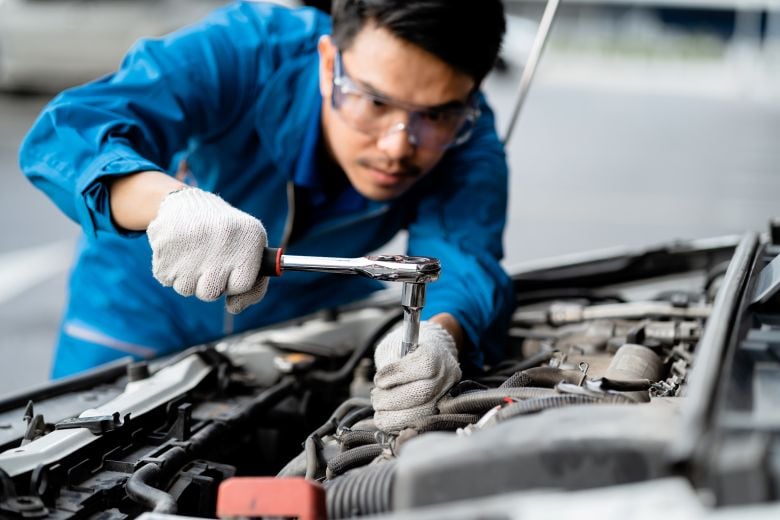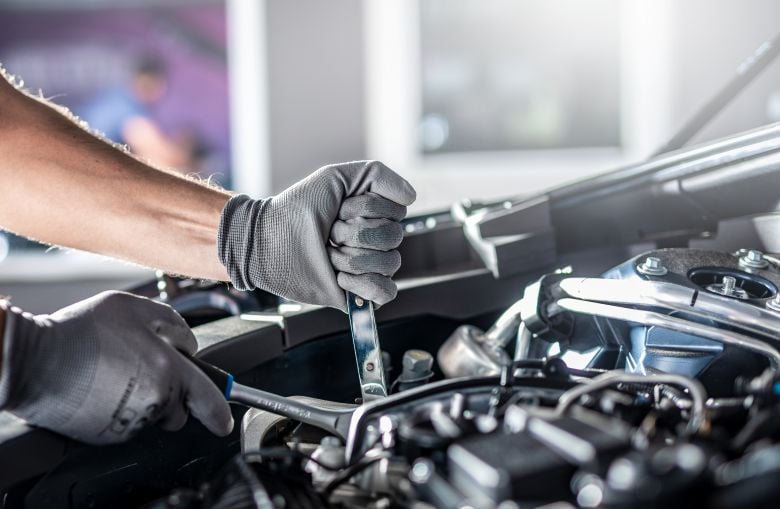
Trade School Insider: 6 Auto Technician Specialization Tracks to Consider
- PEAK Squad
- PEAK
- April 9, 2025
Consider the following auto technician jobs & tracks for trade school.
Auto technician training programs can help you turn your love of cars into a rewarding career. Widely available at trade schools, community colleges, and specialized technical institutions, automotive tech programs usually lead to a certificate or associate degree. Employers value these credentials and increasingly require them when filling job openings.
Trade schools offer generalist tracks that build broad, versatile skill sets along with specialized programs that develop specific technical proficiencies. By specializing, you can build targeted skills and expert knowledge that can help you market yourself to employers more effectively.
Let's take a closer look at six intriguing specialization options trade schools offer.


Collision repair
This specialization track focuses on repairing damaged vehicles. Coursework typically covers topics like:
- Structural analysis and repair
- Vehicle control system repair
- Metal welding and cutting
- Auto body painting and refinishing
Collision repair programs usually also cover auto glass technician training, cost estimating, repair operations and procedures, and shop management best practices.
You might secure a pay bump by becoming an auto body technician. According to the Bureau of Labor Statistics (BLS), auto body and glass repairers earned a slightly higher median salary in 2023 than service tech generalists.
Interested in exploring auto technician jobs and hiring trends in more detail? Check out our deep dive into the career outlook for automotive technical school graduates and our piece on emerging auto tech jobs.
Engine repair
Engine trouble is one of the most common reasons drivers bring their cars in for repairs. Automotive engine repair programs build the knowledge and skills you'll need to fix just about any engine problem.
These specialized programs usually begin with a review of engine fundamentals, emphasizing the high-tech builds found in modern vehicles. You'll then learn about the foundational principles of engine repair before proceeding through introductory and intermediate engine service modules.
Trade schools often offer engine repair programs in shorter formats, intending them as supplements to your existing knowledge, training, and technical skills.
Electrical systems service and repair
Automotive electrical systems have become much more complex in recent years as manufacturers continue to load up their vehicles with ever more gadgetry. In response, many technical schools have developed concentration tracks that focus exclusively on servicing and repairing vehicles' electrical systems and components.
These programs often begin with a review of electricity basics. You'll then learn about automotive electrical system structures and layouts, and proceed to explore basic to intermediate concepts in electrical system service and repair.
Fair warning: This track may require applied science and math in areas like electricity physics and algebra. If those subjects aren't your jam, another specialization might be a better match.


Electric vehicle (EV) technology
In 2024, Bloomberg projected that EVs could account for about half of all passenger vehicle sales by the end of the decade. With EVs taking over ever-increasing shares of the vehicle market, electric vehicle technology specialists could well find themselves in very high demand in the years ahead.
Trade schools have already moved to address the EV market with specialized auto tech training programs covering topics like:
- Electric motors
- EV battery technologies and safety systems
- Emissions and energy performance management
- Charging station installation and maintenance
Many EV-focused auto technician programs also explore traditional and plug-in hybrid vehicle technologies. You'll emerge ready to work on any vehicle that uses electricity as a main or supplementary energy source.
Motorsports vehicle technology
This rare but cool option can prepare you for a career as a motorsports technician. If you love auto racing and dream of working on the supercars the pros use, this specialization is right up your alley.
Your courses will cover topics like these from a motorsports angle:
- Vehicle dynamics and aerodynamics
- Control systems and instrumentation
- Suspension design
- Engine building and tuning
- Transmissions, transaxles, and differential builds
You'll also learn about trackside service and repair procedures, motorsports vehicle electronics, tire mechanics, and fuel systems.
Another fair warning: Motorsports engineering and vehicle technology programs explore highly technical subjects such as computer aided design (CAD) and manufacturing (CAM), finite element analysis, and metrology. A strong background in computer science, physics, and mathematics will be an asset.
Automotive trim and upholstery
Here's another uncommon specialization option you can explore if you're interested in developing a unique niche. Automotive trim and upholstery programs cover both installation and repair techniques, with many also including required or elective courses in collision repair.
You'll learn about:
- Trim and upholstery tools
- Removal, repair, and reinstallation techniques
- Upholstery and trim materials and their properties
- Mechanical and technical elements including springs, coverings, seat fillings, and paddings


More concentration and specialization options
Beyond these concentration tracks, you can also look for programs with embedded specialization sequences and auto technician courses focused specifically on particular vehicle brands.
Embedded microcredentials
Some technical schools embed specialization options within their generalist curricula, allowing you to choose one or more concentrations to pursue. These program structures are more common in programs that span a full academic year or more, and are regularly featured in two-year associate degree programs.
Depending on how your program is set up, you might earn an official certification credential in your chosen specialization(s) or a certificate of achievement that will be noted in academic documents like your diploma and transcripts. Some of the focus areas you can pursue include:
- Automotive air conditioning and heating
- Drivetrain service and repair
- Engine performance
- Front end and brakes
Manufacturer-specific technician programs
You can also complete automotive tech programs that focus solely on vehicles made by a particular manufacturer. These are ideal if you want to work in a dealership service garage, or at an independent shop that caters to customers who own particular makes and models. You could also open your own shop dedicated to servicing specific auto brands.
Technical schools offer manufacturer-specific programs for just about every major automaker operating in the U.S. market. Some institutions use accelerated structures to move students through coursework quickly, making it viable to complete multiple manufacturer-specific programs in a single calendar year.
PEAK Auto supports your trade school journey
Technical school is a practical alternative to college and a great option for hands-on learners who want affordable, efficient, and career-oriented training. It offers a long list of appealing advantages, which you can explore in detail in our piece on the benefits of automotive technical training.
Here at PEAK, we know how promising labor market trends are looking for technical school grads. We’re proud to participate in the technical-school-to-job pipeline through partnership programs with vocational education providers and valuable scholarships for automotive technology students.
Our PEAK Performance Scholarships program that launched in 2022 provides two lucky winners with up to $12,500 in educational funding each year. The program recognizes high-potential students committed to a career in servicing commercial vehicles.
We also partnered with Milwaukee Area Technical College to build and equip the Al Hurvis PEAK Transportation Center. This multimillion-dollar state-of-the-art educational facility delivers an innovative learning experience to MATC students and stands as a testament to the value we place on excellence in technical education.



